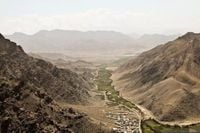In a surprising move, Russian businessman Anatoly Aronov has announced plans to launch a travel agency named 'Taliban Tour,' aimed at organizing trips to Afghanistan. This initiative comes in the wake of a recent decision by Russian authorities to reconsider the status of the Taliban, which has sparked both interest and concern among potential travelers.
According to reports from RT, Aronov has already submitted an application to register the trademark for 'Taliban Tour' with the relevant authorities. The agency plans to cater to small groups of travelers, offering packages that include cultural experiences in Afghanistan, specifically targeting those interested in the country’s rich history and culture.
The proposed tours will accommodate groups of three to five people and will last approximately two weeks. Aronov has indicated that a seven-day tour would cost around 100,000 rubles (approximately $1,300), making it accessible for a niche market of adventure seekers and cultural enthusiasts.
Aronov's decision to establish this travel agency is notably influenced by the recent legal changes regarding the Taliban's status in Russia. On April 17, 2025, the Russian Supreme Court lifted the ban on the Taliban's activities within the country, a significant shift considering the group had been designated as a terrorist organization since 2003. This change has opened doors for new business opportunities, particularly in the tourism sector.
"I want to legally secure this brand after the Supreme Court's ruling," Aronov stated. His intention is to provide a unique travel experience that allows Russians to connect with Afghanistan, especially those who served in the Afghan war. He believes that veterans will be particularly drawn to the trips, as they may wish to revisit places from their past.
Despite the potential for tourism, Aronov has expressed caution regarding women traveling to Afghanistan. He remarked, "It's tough for them there... I think women won't travel. Why would they seek adventures on their backs?" This comment reflects the current socio-political climate in Afghanistan, where the Taliban has enforced strict laws, particularly affecting women's rights.
Since the Taliban regained power in Afghanistan in August 2021, following the withdrawal of U.S. troops, the group has implemented a range of severe restrictions on women's freedoms. Women are prohibited from receiving education beyond primary school, leaving their homes without a male guardian, and participating in many public activities. These measures have raised concerns internationally about human rights violations.
Despite these issues, Russian officials have maintained a dialogue with the Taliban. The Kremlin's approach has been characterized by a pragmatic engagement, with Russian Foreign Minister Sergey Lavrov describing the Taliban as "manageable people." This perspective has been echoed by other officials, suggesting a shift in how the Taliban is viewed in the context of international relations.
Aronov’s venture into Afghan tourism is not without its challenges. The Taliban's government, although recognized by some countries, remains largely unacknowledged on the global stage due to its human rights record. No nation has officially recognized the Taliban's government as legitimate, complicating the landscape for businesses looking to operate in or with Afghanistan.
In this context, Aronov's 'Taliban Tour' seeks to capitalize on a unique niche in the travel market, appealing to those with historical ties to Afghanistan. The businessman has expressed confidence that the tours will attract not only veterans but also those curious about Afghan culture, stating, "Afghans will be interested in this, they might even pay extra. Because all Western countries are not going there, and Russians have memories of the Afghan war. There were hundreds of thousands of them... They will want to see and feel their youth."
As the situation develops, it remains to be seen how the Russian public will respond to the idea of traveling to Afghanistan, a country still grappling with the aftermath of decades of conflict and a complex political landscape. Aronov's plans come at a time when travel to unconventional destinations is gaining traction among adventurous travelers, yet the risks associated with visiting Afghanistan cannot be overlooked.
In conclusion, the launch of 'Taliban Tour' highlights a significant shift in the Russian approach to Afghanistan, blending entrepreneurial spirit with the complexities of international relations. While the potential for cultural exchange exists, the realities on the ground present a challenging environment for both travelers and tour operators alike.







